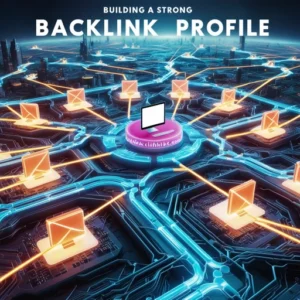What Are Backlinks and Why Do They Matter?
A backlink, also known as an inbound link, occurs when one website links to another. These links are considered a vote of confidence or endorsement from one site to another, signaling to search engines that the content being linked to is valuable and trustworthy. In essence, backlinks serve as digital recommendations, contributing to the authority and credibility of a website.
Search engines, particularly Google, use backlinks as a key ranking factor. When a website accrues high-quality backlinks from reputable sources, search algorithms interpret this as a sign of reliability and relevance, ultimately leading to better rankings in search results. Conversely, websites with few or poor-quality backlinks may struggle to rank competitively, regardless of the quality of their content.
Why
Improving Search Rankings: Backlinks are one of Google’s top three ranking signals. When your website is linked to by authoritative sites, it boosts your ranking potential. Each quality backlink you acquire acts as a vote of confidence for your website’s relevance to the target keyword.
Increasing Website Traffic: Backlinks not only improve your search rankings but also drive referral traffic from the linked site to your own. When users see a link to your site on a reputable source, they are more likely to click through, increasing your overall traffic.
Enhancing Domain Authority: Domain authority (DA) is a metric that predicts how well a website will rank on search engines. Quality backlinks from high-DA websites significantly enhance your site’s authority, making it easier to rank for competitive keywords.
Building Brand Awareness: By acquiring backlinks from influential websites, your brand gains exposure to new audiences, helping to build brand recognition and credibility.
Types of Backlinks and Their Impact
Not all backlinks are created equal. The value of a backlink is determined by several factors, including the authority of the linking site, the relevance of the content, and the anchor text used. Understanding the different types of backlinks and their impact on SEO is essential for building a successful link-building strategy.
1. Natural Backlinks
Natural backlinks are earned organically when other websites link to your content without you actively seeking the link. These backlinks are often the most valuable because they indicate that your content is genuinely useful and informative. For example, a blogger might link to your research article because they find it relevant to their post.
2. Editorial Backlinks
Editorial backlinks are links included in the content of another site because the site owner or author believes your content enhances their own. These backlinks are typically placed in high-quality, relevant articles or blog posts. Editorial backlinks from reputable sources are highly coveted in SEO because they signal trustworthiness and authority.
3. Guest Post Backlinks
Guest posting involves creating content for another website in exchange for a backlink to your site. While this method requires more effort, guest post backlinks can be highly effective when done correctly. However, the key to success is contributing content to reputable, niche-relevant sites rather than spammy or low-quality blogs.
4. Nofollow vs. Dofollow Backlinks
Backlinks are categorized into two main types: nofollow and dofollow. Dofollow backlinks pass on link equity (also known as “link juice”) to your website, which directly impacts your search rankings. On the other hand, nofollow backlinks do not pass link equity but can still drive traffic and boost brand awareness. While dofollow backlinks are more desirable for SEO, a healthy mix of both types is essential for a natural backlink profile.
How to Build a Strong Backlink Profile
Building a strong backlink profile requires a strategic approach focused on quality over quantity. Acquiring backlinks from low-quality or irrelevant sites can harm your SEO efforts and even lead to penalties from search engines. Here are some proven strategies to help you build a robust backlink profile.
1. Create High-Quality, Shareable Content
The cornerstone of any successful backlink strategy is high-quality content. When you create valuable, informative, and engaging content, other websites are more likely to link to it. This could include in-depth blog posts, case studies, infographics, videos, and comprehensive guides. The more shareable your content is, the more likely it is to earn natural backlinks.
2. Leverage Influencer and Blogger Outreach
Reaching out to influencers, bloggers, and journalists in your niche is an effective way to secure editorial backlinks. By offering them valuable content or insights, you can encourage them to mention or link to your site. Personalizing your outreach efforts and demonstrating the value of your content can significantly increase your chances of success.
3. Use Broken Link Building
Broken link building involves identifying broken links on other websites and suggesting your content as a replacement. This not only helps the website owner fix their broken links but also provides you with a valuable backlink. Tools like Ahrefs and SEMrush can help you identify broken links on high-authority sites within your niche.
4. Guest Posting on Reputable Sites
Guest posting remains one of the most effective link-building strategies when done correctly. Focus on publishing high-quality content on reputable, niche-relevant websites. This helps you gain valuable backlinks and exposes your brand to a wider audience. Be sure to include a natural, contextual backlink to your site within the guest post.
5. Engage in Industry Partnerships and Collaborations
Collaborating with industry peers, partners, or organizations can result in valuable backlinks. Whether it’s co-authoring content, participating in interviews, or hosting joint webinars, partnerships offer unique opportunities to build high-quality backlinks.




What do you think?
I don’t think the title of your article matches the content lol. Just kidding, mainly because I had some doubts after reading the article.